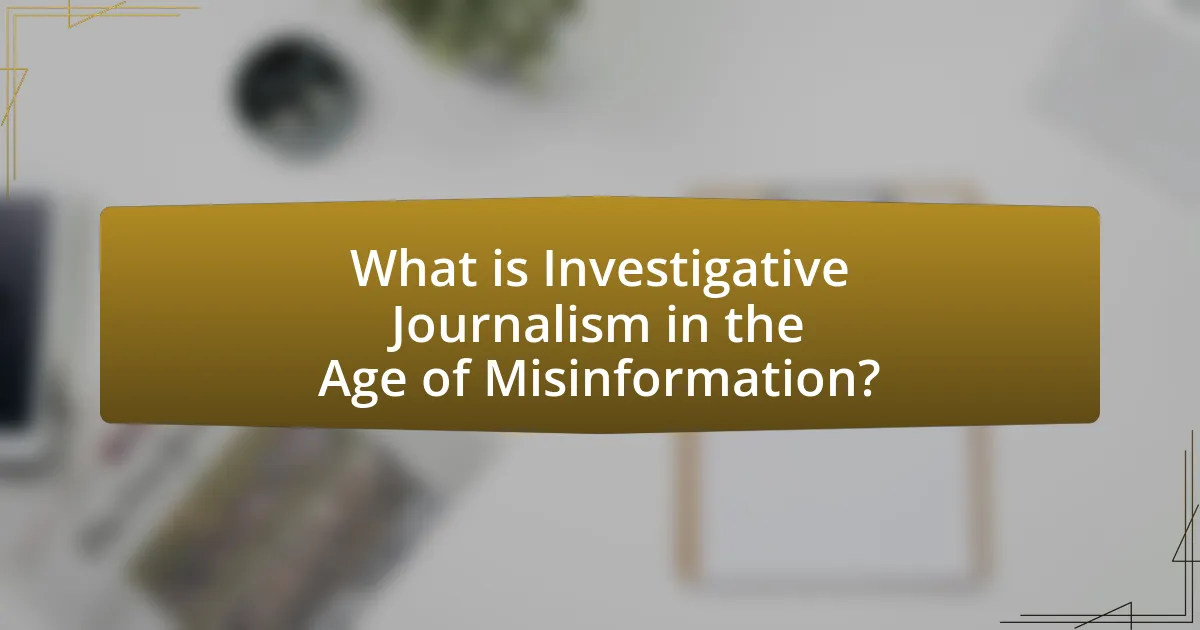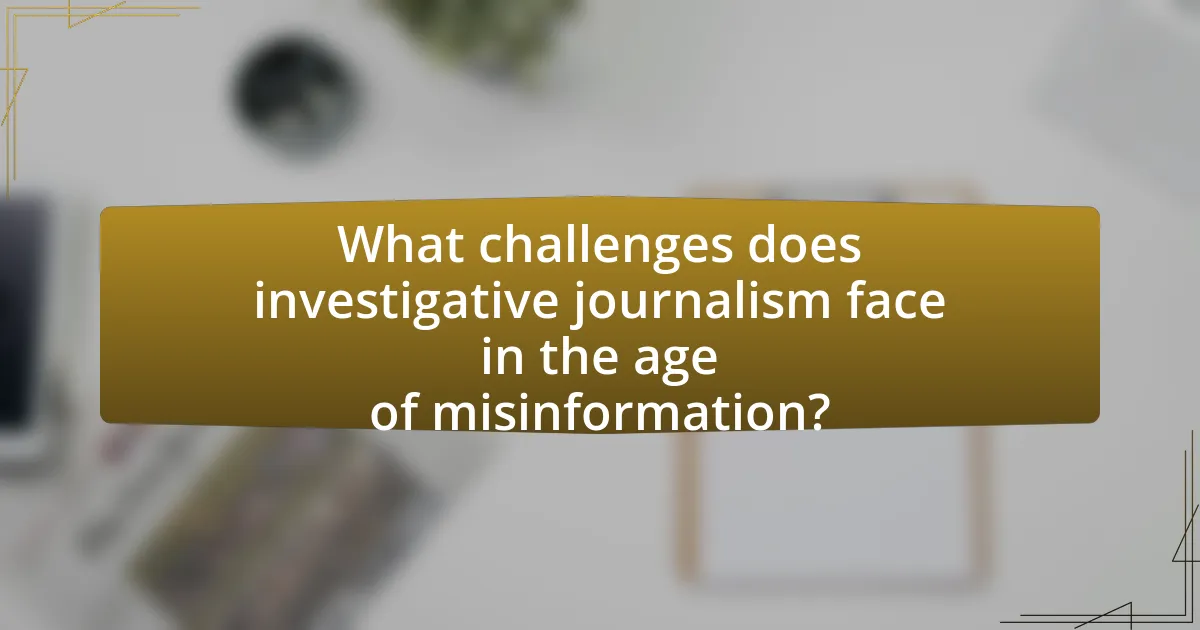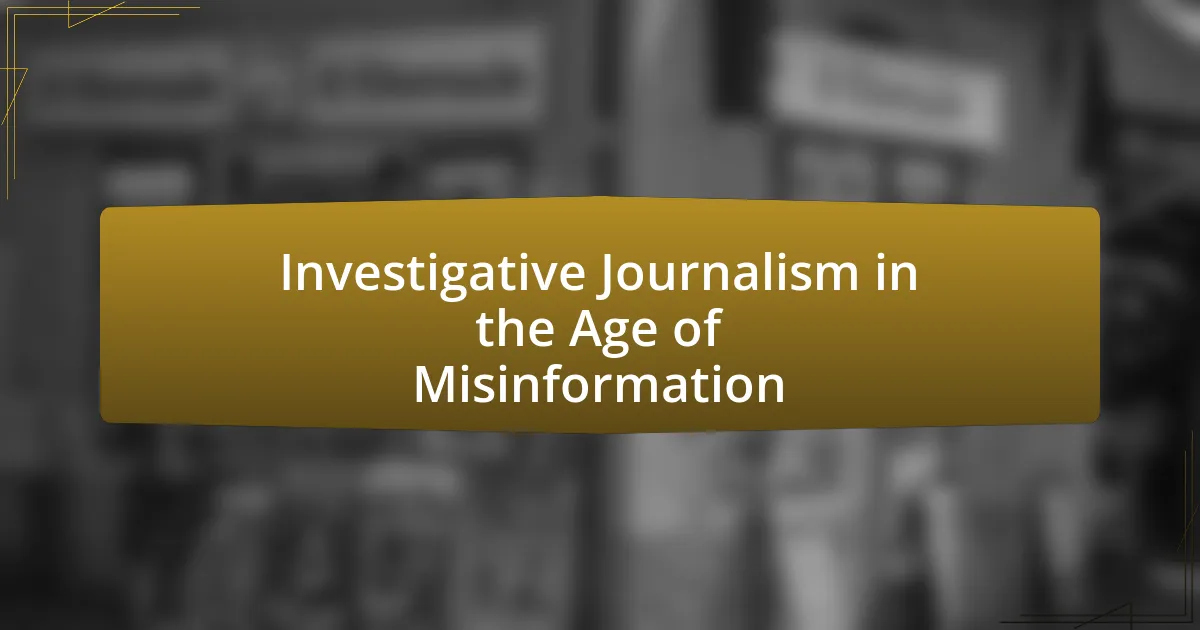Investigative journalism in the age of misinformation is a critical practice aimed at uncovering the truth behind complex societal issues while countering the prevalence of falsehoods. This article explores the evolution of investigative journalism, highlighting its key characteristics such as thorough research, transparency, and accountability. It examines the challenges faced by journalists, including the impact of misinformation on public perception and trust, as well as the legal and ethical dilemmas they encounter. Additionally, the article discusses the role of technology and collaboration in enhancing investigative efforts, the importance of audience engagement, and the skills necessary for future journalists to navigate this evolving landscape effectively.

What is Investigative Journalism in the Age of Misinformation?
Investigative journalism in the age of misinformation is a form of journalism that seeks to uncover the truth behind complex issues, often involving significant public interest, while navigating a landscape filled with falsehoods and misleading information. This type of journalism employs rigorous research, fact-checking, and critical analysis to expose corruption, fraud, and abuse of power, ensuring that the public receives accurate and reliable information. For instance, a study by the Pew Research Center in 2020 found that 53% of Americans believe that misinformation is a major problem in society, highlighting the critical role investigative journalism plays in countering false narratives and promoting transparency.
How has the role of investigative journalism evolved in recent years?
The role of investigative journalism has evolved significantly in recent years, primarily due to the rise of digital media and the increasing prevalence of misinformation. Investigative journalists now utilize advanced technology and social media platforms to uncover and disseminate information more rapidly and widely than traditional methods allowed. For instance, the use of data analytics and online databases has enhanced their ability to investigate complex issues, such as corruption and fraud, leading to more impactful reporting. Additionally, the demand for transparency and accountability in the age of misinformation has heightened the importance of investigative journalism, as it serves as a critical tool for fact-checking and exposing false narratives. According to a 2021 report by the Pew Research Center, 70% of Americans believe that investigative journalism is essential for democracy, underscoring its evolving role in maintaining an informed public.
What are the key characteristics of investigative journalism today?
The key characteristics of investigative journalism today include thorough research, transparency, and a focus on accountability. Investigative journalists employ rigorous methods to uncover hidden truths, often involving extensive interviews, document analysis, and data verification. Transparency is crucial, as journalists disclose their sources and methodologies to build trust with the audience. Additionally, investigative journalism emphasizes holding powerful entities accountable, often exposing corruption, abuse, or injustice. This approach is increasingly vital in the age of misinformation, where accurate reporting serves as a counterbalance to false narratives and promotes informed public discourse.
How does investigative journalism differ from traditional journalism?
Investigative journalism differs from traditional journalism primarily in its depth and focus on uncovering hidden truths, often involving extensive research and analysis. While traditional journalism typically reports on current events and provides straightforward news coverage, investigative journalism seeks to expose corruption, misconduct, or systemic issues through in-depth investigations that may take months or years to complete. For example, the Watergate scandal investigation by The Washington Post exemplifies how investigative journalism can lead to significant political consequences, showcasing its role in holding power accountable.
Why is investigative journalism crucial in combating misinformation?
Investigative journalism is crucial in combating misinformation because it rigorously uncovers the truth behind claims and narratives, providing verified information to the public. This form of journalism employs thorough research, fact-checking, and in-depth analysis to expose falsehoods and hold accountable those who spread misinformation. For instance, a study by the Pew Research Center found that investigative reporting significantly enhances public understanding of complex issues, thereby reducing the spread of false information. By presenting well-researched facts and context, investigative journalism serves as a vital tool for fostering informed discourse and promoting media literacy among audiences.
What impact does misinformation have on public perception?
Misinformation significantly distorts public perception by shaping beliefs and attitudes based on false or misleading information. Studies indicate that exposure to misinformation can lead to the formation of incorrect beliefs, as individuals often rely on the information they encounter to make judgments about issues. For instance, research published in the journal “Science” found that people who were exposed to false information about vaccines were more likely to develop negative attitudes toward vaccination, demonstrating how misinformation can influence public health perceptions. Additionally, misinformation can create polarization, as differing narratives lead to divided opinions within communities, further complicating consensus on critical issues.
How can investigative journalism restore trust in media?
Investigative journalism can restore trust in media by providing thorough, fact-based reporting that uncovers truths and holds powerful entities accountable. This form of journalism often involves extensive research, interviews, and data analysis, which can reveal corruption, injustice, or misinformation that may otherwise go unchallenged. For instance, the Watergate scandal investigation by The Washington Post in the 1970s exemplified how diligent investigative reporting led to significant political accountability and a renewed public trust in journalism. By consistently delivering accurate and impactful stories, investigative journalism reinforces the media’s role as a watchdog, thereby enhancing credibility and fostering public confidence.

What challenges does investigative journalism face in the age of misinformation?
Investigative journalism faces significant challenges in the age of misinformation, primarily due to the rapid spread of false information and the erosion of public trust in media. The prevalence of social media platforms allows misinformation to circulate widely and quickly, making it difficult for investigative journalists to verify facts and maintain credibility. According to a 2021 Pew Research Center study, 64% of Americans believe that misinformation has a major impact on their confidence in news sources. This environment complicates the journalist’s role, as they must not only uncover the truth but also combat the narratives propagated by misinformation. Additionally, the financial constraints faced by many news organizations limit resources available for thorough investigative work, further hindering the ability to counteract false narratives effectively.
How does the prevalence of misinformation affect journalistic integrity?
The prevalence of misinformation significantly undermines journalistic integrity by eroding public trust in media sources. When journalists disseminate false or misleading information, it leads to skepticism among audiences, making it difficult for credible news organizations to maintain their authority. A study by the Pew Research Center found that 64% of Americans believe that fabricated news stories cause confusion about basic facts, which directly impacts the perceived reliability of journalism. This erosion of trust can result in decreased engagement with legitimate news outlets, ultimately harming the overall quality of public discourse and informed decision-making.
What are the risks associated with reporting on misinformation?
Reporting on misinformation carries significant risks, including the potential for spreading false narratives, damaging reputations, and undermining public trust in media. When journalists report on misinformation without thorough fact-checking, they may inadvertently amplify false claims, leading to widespread misconceptions. A study by the Pew Research Center found that 64% of Americans believe that misinformation has caused confusion about basic facts, highlighting the detrimental impact on public understanding. Additionally, journalists may face backlash from individuals or groups whose interests are threatened by accurate reporting, resulting in harassment or legal challenges. These risks underscore the importance of rigorous verification processes in investigative journalism.
How do journalists verify information in a landscape filled with falsehoods?
Journalists verify information in a landscape filled with falsehoods by employing rigorous fact-checking methods, cross-referencing multiple credible sources, and utilizing verification tools. They often consult primary sources, such as official documents, eyewitness accounts, and expert opinions, to ensure accuracy. For instance, the International Fact-Checking Network outlines best practices for verification, emphasizing the importance of transparency in sourcing and the need to corroborate claims with evidence. Additionally, journalists may use digital tools like reverse image searches and metadata analysis to authenticate visual content, further enhancing the reliability of their reporting.
What legal and ethical dilemmas do investigative journalists encounter?
Investigative journalists encounter significant legal and ethical dilemmas, primarily related to issues of confidentiality, defamation, and the balance between public interest and privacy. Journalists often face legal challenges when protecting sources, as revealing identities can lead to legal repercussions for both the journalist and the source. For instance, the case of Judith Miller, a journalist who was jailed for refusing to disclose a source, highlights the tension between journalistic integrity and legal obligations. Additionally, ethical dilemmas arise when determining the public interest versus individual privacy rights, as seen in high-profile investigations that expose wrongdoing but may also infringe on personal lives. Furthermore, defamation laws can pose risks, as journalists must ensure accuracy to avoid legal action from individuals or organizations they report on. These dilemmas are compounded in the age of misinformation, where the pressure to publish quickly can lead to ethical oversights and potential legal consequences.
How do laws regarding defamation impact investigative reporting?
Laws regarding defamation significantly impact investigative reporting by imposing legal risks that journalists must navigate to avoid liability. Investigative reporters often face the challenge of balancing the public’s right to know with the potential for defamation claims, which can arise if they publish false statements that harm an individual’s reputation. For instance, the landmark case of New York Times Co. v. Sullivan established the “actual malice” standard, requiring public figures to prove that a statement was made with knowledge of its falsity or with reckless disregard for the truth. This legal precedent encourages journalists to conduct thorough fact-checking and verification processes before publishing potentially damaging information, thereby influencing the scope and approach of investigative reporting.
What ethical guidelines should journalists follow when exposing misinformation?
Journalists should adhere to several ethical guidelines when exposing misinformation, including accuracy, transparency, and accountability. Accuracy requires journalists to verify information through credible sources before publication, ensuring that claims are substantiated. Transparency involves disclosing the methods used to gather information and the sources consulted, which builds trust with the audience. Accountability mandates that journalists correct errors promptly and take responsibility for the impact of their reporting. These guidelines are essential for maintaining journalistic integrity and fostering public trust, especially in an era where misinformation can spread rapidly.

What strategies can investigative journalists employ to succeed?
Investigative journalists can succeed by employing strategies such as thorough research, building strong sources, and utilizing data analysis. Thorough research allows journalists to gather credible information and verify facts, which is essential in an era where misinformation is prevalent. Building strong sources fosters trust and facilitates access to critical information, enabling journalists to uncover hidden truths. Additionally, utilizing data analysis helps in identifying patterns and trends that can support investigative claims, enhancing the overall credibility of the reporting. These strategies are validated by the increasing reliance on data-driven journalism, which has been shown to improve the accuracy and impact of investigative work.
How can technology aid investigative journalism in the fight against misinformation?
Technology aids investigative journalism in the fight against misinformation by providing tools for data analysis, fact-checking, and audience engagement. Advanced software enables journalists to analyze large datasets quickly, identifying patterns and inconsistencies that may indicate misinformation. For instance, platforms like Google Trends and social media analytics tools allow journalists to track the spread of false narratives in real-time. Additionally, fact-checking tools such as Snopes and FactCheck.org help verify claims and provide context, enhancing the credibility of journalistic work. Furthermore, technology facilitates collaboration among journalists through shared platforms, enabling them to pool resources and expertise to combat misinformation more effectively.
What tools are available for fact-checking and verification?
Tools available for fact-checking and verification include Snopes, FactCheck.org, and PolitiFact. Snopes is widely recognized for debunking urban legends and misinformation, while FactCheck.org focuses on political claims and provides thorough analysis. PolitiFact rates the accuracy of statements made by public figures on a scale from true to false. These platforms utilize rigorous research methods and source verification to ensure the reliability of their findings, making them essential resources in combating misinformation.
How can social media be leveraged for investigative purposes?
Social media can be leveraged for investigative purposes by providing real-time information, facilitating the gathering of evidence, and enabling the identification of sources. Investigators can monitor platforms for user-generated content related to events, which often includes eyewitness accounts, photographs, and videos that may not be available through traditional media. For instance, during crises or protests, social media posts can reveal on-the-ground realities and help verify facts through timestamps and geolocation data. Additionally, tools like social media analytics can track trends and sentiments, aiding in understanding public opinion and uncovering misinformation. Research by the Pew Research Center indicates that 64% of Americans believe social media is a valuable source for news, highlighting its significance in modern investigative journalism.
What best practices should journalists adopt to enhance their investigations?
Journalists should adopt a systematic approach to enhance their investigations, focusing on thorough research, fact-checking, and ethical standards. Implementing a structured methodology, such as the use of the “5 Ws” (who, what, where, when, why) ensures comprehensive coverage of the story. Additionally, utilizing reliable sources and cross-referencing information with multiple outlets increases accuracy and credibility. According to a study by the Pew Research Center, 62% of Americans believe that journalists should prioritize fact-checking to combat misinformation. This highlights the importance of verifying facts before publication to maintain public trust and uphold journalistic integrity.
How can collaboration among journalists improve investigative outcomes?
Collaboration among journalists can significantly improve investigative outcomes by pooling resources, expertise, and information, which enhances the depth and breadth of investigations. When journalists work together, they can share leads, access specialized knowledge, and combine their networks, leading to more comprehensive coverage of complex issues. For instance, the Panama Papers investigation exemplified this, where over 370 journalists from 76 countries collaborated, resulting in the exposure of widespread tax evasion involving numerous high-profile individuals. This collaborative effort not only increased the volume of information gathered but also provided a more robust verification process, ultimately leading to impactful revelations that individual journalists might not have achieved alone.
What role does audience engagement play in effective investigative journalism?
Audience engagement is crucial for effective investigative journalism as it fosters trust, enhances credibility, and encourages community involvement in the reporting process. Engaged audiences are more likely to share information, provide tips, and contribute to the investigation, which can lead to more comprehensive and accurate reporting. For instance, a study by the Pew Research Center found that 64% of Americans believe that news organizations should engage with their audiences to improve the quality of journalism. This interaction not only helps journalists gather diverse perspectives but also empowers the audience to hold institutions accountable, thereby reinforcing the role of investigative journalism in a democratic society.
What are the future prospects for investigative journalism in the age of misinformation?
The future prospects for investigative journalism in the age of misinformation are increasingly challenging yet vital for democratic societies. As misinformation proliferates, investigative journalism will play a crucial role in fact-checking and exposing false narratives, thereby restoring public trust in media. According to a 2021 Pew Research Center study, 64% of Americans believe that misinformation has a significant impact on their ability to stay informed, highlighting the need for rigorous investigative efforts. Furthermore, advancements in technology, such as data analytics and AI, can enhance investigative capabilities, allowing journalists to uncover hidden truths more efficiently. Thus, while the landscape is fraught with challenges, the demand for credible investigative journalism is likely to grow, reinforcing its importance in combating misinformation.
How might investigative journalism adapt to changing media landscapes?
Investigative journalism might adapt to changing media landscapes by leveraging digital tools and platforms to enhance research, collaboration, and audience engagement. As traditional media faces challenges from misinformation and declining trust, investigative journalists can utilize data analytics, social media, and multimedia storytelling to reach wider audiences and verify information more effectively. For instance, the use of crowdsourcing platforms allows journalists to gather tips and insights from the public, while data visualization tools can help present complex findings in an accessible manner. Additionally, partnerships with tech companies and non-profit organizations can provide resources and training to navigate the evolving digital environment, ensuring that investigative journalism remains relevant and impactful in combating misinformation.
What skills will future investigative journalists need to thrive?
Future investigative journalists will need strong digital literacy skills to thrive. This includes proficiency in data analysis, understanding of social media dynamics, and the ability to utilize advanced research tools to verify information. As misinformation proliferates, journalists must be adept at distinguishing credible sources from unreliable ones, employing fact-checking techniques, and utilizing tools like reverse image search and metadata analysis. Additionally, strong communication skills are essential for effectively conveying complex information to the public and fostering trust. According to a 2021 report by the Reuters Institute for the Study of Journalism, 61% of journalists believe that digital skills are increasingly important in combating misinformation, highlighting the necessity for ongoing training in these areas.
What practical tips can journalists follow to navigate misinformation effectively?
Journalists can navigate misinformation effectively by employing fact-checking, verifying sources, and utilizing reliable databases. Fact-checking involves cross-referencing claims with established facts, which is crucial given that misinformation can spread rapidly; for instance, a study by the MIT Media Lab found that false news spreads six times faster than true news on Twitter. Verifying sources ensures that information comes from credible and authoritative entities, reducing the risk of disseminating false information. Additionally, journalists should leverage reliable databases such as Snopes or FactCheck.org to confirm the accuracy of information before publication. These practices are essential in maintaining journalistic integrity and public trust in an era where misinformation is prevalent.

Leave a Reply